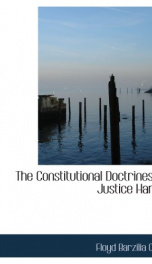the constitutional doctrines of justice harlan

During his long tenure on the U.S. Supreme Court John Marshall Harlan [1833-1911] wrote numerous dissenting opinions on everything from civil rights to the federal income tax. He was said at the time to suffer from "dissent-ary," but posterity has shown him to be a liberal born too soon since many aspects of his dissents gained majorities after his death. We see this most clearly in his blistering dissents in the Civil Rights Cases (1883) and Plessy v. Ferguson (1896). On a broader scale, his interpretation of "due process" contributed to the development of the incorporation theory during the 1950s and 60s. Viewed as a whole his emphasis on the social consequences of decisions rather than their adherence to abstract legal principles pointed the way toward the work of Pound and Llewellyn. Clark offers an excellent introduction to Harlan's doctrines regarding civil rights, the suability of states, impairment of the obligation of contracts, interstate and foreign commerce, judicial legislation and other topics that is valuable for its balance of summary and interpretation. First published in 1915, it continues to be an essential study of Harlan's judicial beliefs. --This text refers to the Hardcover edition.
Info about the book
Author:
Series:
Unknown
ISBN:
1112280626
Rating:
3.5/5 (4)Your rating:
0/5
Languge:
English
Users who have this book
Users who want this book
What readers are saying
What do you think? Write your own comment on this book!
write a commentif you like the constitutional doctrines of justice harlan try:
Other books by this author
Do you want to read a book that interests you? It’s EASY!
Create an account and send a request for reading to other users on the Webpage of the book!

